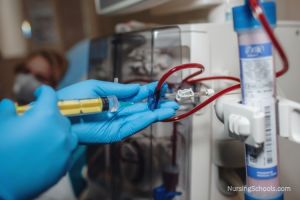Research Nurse
Nursing Career Guide

Behind every medical breakthrough is a team of professionals dedicated to advancing science, and Research Nurses play a key role in that process. These nurses help design studies, monitor patient participants, collect data, and ensure research protocols are followed with both accuracy and compassion. They work in hospitals, universities, pharmaceutical companies, and research institutions, often contributing to innovations that shape the future of healthcare. Let's delve into the Research Nurse specialty and explore what it takes to thrive in this evidence-driven career in nursing.
Overview
What Is a Research Nurse?
A Research Nurse specializes in conducting clinical research studies to improve medical treatments, patient care practices, and healthcare policies. These nurses play a vital role in collecting data, monitoring study participants, and ensuring ethical research practices.
Research Nurses work in hospitals, universities, pharmaceutical companies, and government agencies. They assist in clinical trials, evaluate the effectiveness of new medications and treatments, and contribute to advancements in healthcare.
This career requires strong analytical skills, attention to detail, and knowledge of research ethics to ensure studies meet regulatory guidelines and benefit patient outcomes.
Education
How To Become a Research Nurse
Becoming a Research Nurse requires a combination of advanced nursing education, clinical experience, certification, and specialized training in medical research. Follow these steps to enter this challenging and rewarding healthcare career:
- Earn a Nursing Degree. Complete a Bachelor of Science in Nursing (BSN). A BSN is preferred over an Associate Degree in Nursing (ADN) for research roles.
- Pass the NCLEX-RN. Obtain your nursing license by passing the National Council Licensure Examination for Registered Nurses (NCLEX-RN).
- Gain Clinical Experience. Work as a Registered Nurse (RN) in hospital settings, outpatient clinics, or research institutions.
- Pursue Research-Specific Training. Consider earning a Master of Science in Nursing (MSN) or completing a Clinical Research Coordinator (CRC) or Certified Clinical Research Professional (CCRP) certification.
- Continue Professional Development. Stay updated with advancements in research protocols, patient safety guidelines, and data analysis through continuing education courses and professional workshops.
On average, it takes 6-8 years to become a Research Nurse, including nursing school, licensure, and obtaining specialized training. Higher education and certifications improve job prospects in this field.

Average Salary
How Much Does a Research Nurse Make?
Salaries for Research Nurses vary based on experience, employer, and the type of research conducted. On average, a Research Nurse can expect to earn between $80,000 and $115,000 annually.
Average annual salary for a Research Nurse:
- Entry-level: $80,000 - $90,000 per year.
- Mid-career: $90,000 - $105,000 per year.
- Experienced: $105,000 - $115,000 per year.
The U.S. Department of Labor reports that Research Nurses earn an average hourly wage of approximately $43.00 per hour. Assuming a 40-hour workweek, this equates to an annual salary of $89,440. The lowest 10% earn less than $37.00 per hour, while the highest 10% earn more than $52.00 per hour, resulting in an annual salary range of $76,960 to $108,160 per year.
Job Duties
What Does a Research Nurse Do?
Research Nurses ensure that clinical studies are conducted safely and ethically while collecting valuable data to advance medical science. Their role includes patient monitoring, data collection, and regulatory compliance.
The most common job duties of a Research Nurse:
- Recruiting and Screening Participants. Identify eligible patients for clinical trials and explain study requirements.
- Administering Study Treatments. Provide experimental medications, therapies, and interventions to study participants.
- Monitoring Patient Safety. Assess participants for adverse reactions and report any complications to the research team.
- Collecting and Analyzing Data. Record patient responses, medication effects, and test results for research analysis.
- Ensuring Regulatory Compliance. Adhere to ethical standards and government regulations, including FDA and IRB guidelines.
- Coordinating with Research Teams. Work alongside scientists, physicians, and pharmaceutical companies to ensure accurate study execution.
- Writing and Presenting Research Findings. Contribute to medical publications, present study results, and assist in grant writing.
- Advanced Duties. Experienced Research Nurses may lead clinical trials, design new studies, or transition into academic research roles.
Research Nurses typically work in hospitals, clinical research facilities, universities, and pharmaceutical companies. Their role is essential in advancing healthcare treatments and improving patient care practices.

Essential Skills
What Skills Does a Research Nurse Need?
Research Nurses require a combination of clinical expertise, research methodology knowledge, and strong analytical skills. These skills enable them to contribute to evidence-based advancements in medicine.
Here are some of the skills a Research Nurse needs to succeed:
- Clinical Research Knowledge. Understand clinical trial protocols, informed consent, and study methodologies.
- Data Collection and Analysis. Accurately record and interpret research findings.
- Patient Assessment. Monitor participants for side effects, adverse reactions, and treatment effectiveness.
- Regulatory Compliance. Follow FDA, IRB, and ethical guidelines for human subject research.
- Critical Thinking. Evaluate research data and identify potential study limitations.
- Collaboration. Work with multidisciplinary teams, including scientists, physicians, and study sponsors.
- Communication. Clearly explain research procedures to participants and contribute to scientific reports.
- Attention to Detail. Ensure accurate documentation and adherence to study protocols.
One of the biggest challenges of being a Research Nurse is maintaining compliance with strict research protocols while ensuring participant safety. However, the role is highly rewarding, as it allows nurses to contribute to groundbreaking medical discoveries and improve healthcare outcomes.
Last updated: August 27, 2025
References:
- Registered Nurses. Bureau of Labor Statistics, U.S. Department of Labor. Occupational Outlook Handbook. Retrieved August 27, 2025.
- NCLEX Nurse Licensure Exam. National Council of State Boards of Nursing (NCSBN). Retrieved August 27, 2025.
- Research Nurse. Johnson & Johnson, Nursing Careers. Retrieved August 27, 2025.
- Research Nurse Salary in the United States. ZipRecruiter, Healthcare Career Path. Retrieved August 27, 2025.
- How to Become a Research Nurse. American Nurses Association (ANA). Retrieved August 27, 2025.
- Clinical Research Nursing. National Institutes of Health (NIH), Clinical Center. Retrieved August 27, 2025.
- Research Nursing Certifications. The Association of Clinical Research Professionals (ACRP). Retrieved August 27, 2025.
- The Clinical Research Nurse Role at a Glance. Wake Forest University School of Medicine. Retrieved August 27, 2025.
- Clinical Research Nursing Certificate. University of Pennsylvania, Perelman School of Medicine. Retrieved August 27, 2025.
- How to Become a Research Nurse. The University of Tulsa. Retrieved August 27, 2025.


